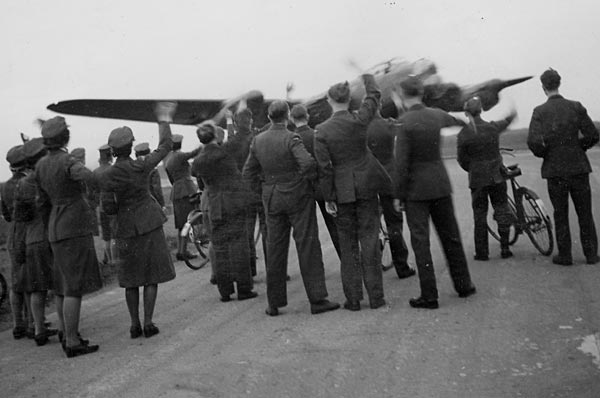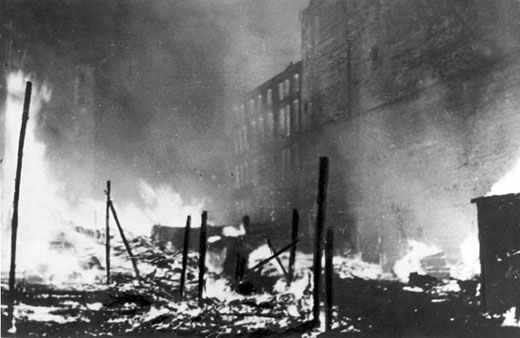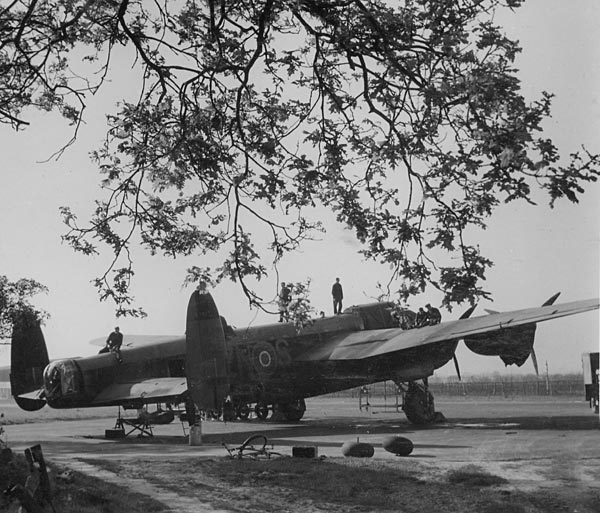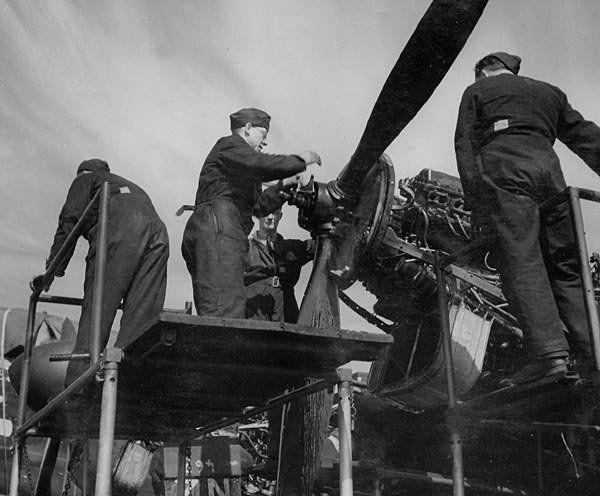Air Operations, Aleutians
11th Air Force aircraft support US 7th Infantry Division troops battling Japanese Army defenders on Attu Island. 11th Air Force aircraft drop supplies (1 B-24), provide air-ground liaision (1 B-24), and mount 7 direct-support attack missions using 10 B-24s, 12 B-25s, and 24 P-38s.
Air Operations, Bismarcks
43rd Heavy Bomb Group B-17s and 90th Heavy Bomb Group B-24s mount individual missions against Gasmata.
[Air Operations, East Indies
V Bomber Command B-25s attack Saumlakki in the Molucca Islands.
[Air Operations, Europe
BOMBER COMMANDEvening Ops:
- 572 aircraft are sent to bomb Duisburg. In this total are 238 Lancasters, 142 Halifaxes, 112 Wellingtons, 70 Stirlings and 10 Mosquitos.
- This is the 4th raid on this city in the Battle of the Ruhr. The first 3 were only partially successful. The Pathfinder marking is near perfect and the Main Force's effort is concentrated. The center of Duisburg and the port area just off the Rhine River suffer severe damage, about 20 hectares worth in the center of the city. 4 Thyssen plants suffer damage from this raid.
- 10 Lancasters, 10 Wellingtons, 9 Halifaxes and 5 Stirlings are lost.
|
|
Waving at Lancasters Bound for Germany |
 |
Air Operations, New Guinea
- V Bomber Command B-25s attack Finschhafen.
- 43rd Heavy Bomb Group B-17s and 90th Heavy Bomb Group B-24s mount individual attacks against Salamaua.
Air Operations, Solomons
- AirSols light bombers and fighters attack the Kahili airfield on Bougainville.
- During the night, Allied naval surface forces bombard the Munda Point airfield on New Georgia and the Vila airfield on Kolombangara. 2 XIII Bomber Command B-24s and 6 B-17s attack Ballale and the Kahili airfield on Bougainville in 2 separate waves.
Air Operations, Tunisia
NATAF A-20s, B-25s, and fighters and IX Bomber Command B-25s continue to attack Axis forces that are still resisting in northeastern Tunisia.
[Aleutians
On the island of Attu, supported by aircraft and naval guns, the 7th Div converges on Jarmin Pass from two directions. A frontal attack carried out from Massacre Bay has no result.
[Allied Planning
Roosevelt and Churchill meet in Washington for the 'Trident' Conference which lasts until May 25. The Americans come to this better prepared for detailed argument than they have been in the past and are determined to get a firm commitment by the British to a cross-Channel invasion. The British feel that their commitment to this has never been in doubt and that the American insistence in planning so formally so far ahead will deprive the Allies of any strategic flexibility, especially in the Mediterranean. The invasion of Sicily has already been agreed but the British wish to be able to exploit this on the Italian mainland and perhaps also to act in the Balkans. The Americans feel that this is motivated by dubious postwar political aims and their Chiefs of Staff are opposed on strategic grounds as well. Adm King has always wanted and striven for priority to be given to the Pacific, and Marshall is worried about doing anything which might detract from the cross-Channel operation which he believes is essential.
From the British point of view a major complaint is that despite the agreed Germany-first policy, the Americans have committed a larger share of their army and air force to the Pacific as well as the bulk of their navy. The British feel that the shortage of shipping which is the major limiting factor for European operations can be put down to this. (In fact an important contributory element of this shortage is the decision taken at Casablanca in January to give priority to the building of escorts for the Battle of the Atlantic and not to landing craft.)
Compromises are reached on all headings. The Americans do not have to accept any real limitations on their Pacific operations and the British get a provisional agreement to exploit any Italian successes. Perhaps the most significant decision taken by the conference is to set a target date for D-Day - May 1, 1944. The British Gen Frederick E. Morgan, is appointed to prepare plans for the invasion. He is given the designation COSSAC (Chief of Staff to the Supreme Allied Commander).
[Battle of the Atlantic
- The Allies successfully deploy the first air-launched torpedo fitted with an acoustic homing head which follows a submerged U-boat, drawn to it by the sound of its propellers. This first use sees U-456 damaged. The first sinking by this means is 24 hours away.
- During operations against convoy SC-129, U-186 is depth-charged and sunk by the destroyer HMS Hesperus.
- during operations against convoy HX-237, U-89 is sighted by Swordfish 'B' of 811 NAS from the escort carrier Biter. The destroyer Broadway and the frigate Lagan are sent to the area where depth charges and a Hedgehog sink the U-boat.
|
|
Burma
The first Arakan campaign ends in a stalemate. The 26th Indian Div evacuates Maungdaw and withdraws to defensive positions further north. It has been a useless sacrifice of men and materials. Most important of the reasons for its failure is the absence of any intervention by Chinese units from Yunnan province.
[Diplomatic Relations
Franco of Spain offers to mediate a peace between Germany and the US and Britain if the Allies sever their ties with the Soviet Union.
[Indian Ocean
The US freighter Cape Neddick (6797t), bound for Suez via Durban, South Africa, is torpedoed by U-195 in the South Atlantic. She eventually reaches Walvis Bay, South Africa under her own power. There are no casualties in the attack.
[North Africa
TUNISIAGen Jürgen von Arnim surrenders to the Allies as the mopping up continues. Since April about 150,000 Axis troops have surrendered to the Allies. The total number will be 238,243. Gen Giovanni Messe is promoted to Field Marshal by Mussolini in the hope that he will be encouraged to hold out.
The collapse of enemy resistance in the south is all but complete by nightfall. Then enemy is surrendering en masse, among them Gen von Arnim, C-in-C, Army Group Africa.
In the British 1st Army's IX Corps area, organized resistance collapses as the 6th Armored Div drives southward from Bou Ficha. The British 8th Army's 56th Div co-operates by shelling from the south. Isolated pockets of enemy remain northwest of Enfidaville. Resistance in the French XIX Corps zone ceases.
[Occupied Poland
Szmul Zygielbojm, leader of Polish Jews and hero of the Siege of Warsaw, commits suicide in London at age 48. His wife and children had already been murdered by the Nazis.
Warsaw Ghetto Uprising |
 |
Pacific
- After an unsuccessful attack on the US battleship Pennsylvania (BB-38), the Japanese submarine I-31 is sunk by the US destroyer Edwards (DD-619), with an assist from the destroyer Farragut (DD-348), about 5 miles northeast of Chichagof Harbor, Attu.
- The US submarine Gudgeon (SS-212) sinks the Japanese army cargo ship Sumatra Maru (5862t) off Bulusan, Luzon.
- The US submarine Pickerel (SS-177) is reported as presumed lost in the Pacific Ocean area.
Solomons
Rear-Adm W. L. Ainsworth leads 4 cruisers and 7 destroyers in 2 groups to shell Vila and Munda. Other vessels also lay mines in the Gulf of Kula a narrow arm of the sea between Kolombangara and New Georgia.
[
